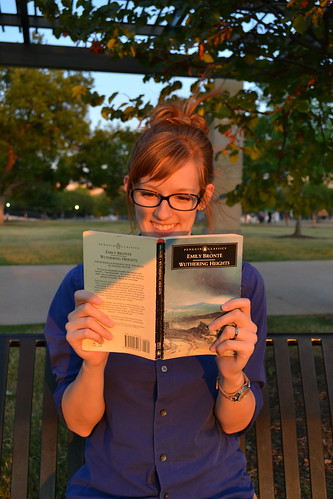Anyone? Bueller?
Well, I do. Not always, but from time to time I get so excited about a book that it's almost better than Christmas. It often happens when I read Victorian literature: Jane Austen, Charles Dickens, Charlotte Bronte...you know, the books that were basically Jersey Shore for 19th century England. Apparently I like smut from all centuries. I am an equal opportunity smut consumer. Most recently, Emily Bronte's Wuthering Heights got me so wrapped up that I finished it in just a few days (lightening speeds for this slow-poke of a reader.)

What else would Wuthering Heights be about but love? Love that seemingly spans distance, time, and even death. Or, so it seems. Even while the characters are declaring their passionate, enduring love, Bronte seems to be questioning the purity of such attachments. Heathcliff and Catherine (they loooooove each other) claim to have a connection rooted at their very souls, yet, they never seem to be able to understand each other's motives and are constantly causing each other heartache. Their notion of an unshakeable, inherent, cosmic love is truly beautiful until one realizes that it completely fails as a practical concept. Despite their passionate soliloquizing, the characters ultimately have nothing in common other than an irrational attachment to each other. They don't even really seem to like each other all that much. Through the confusion of Heathcliff and Catherine's misplaced passion, Bronte completely rejects the possibility that such an intrinsic love could exist, let alone ultimately redeem fatally flawed characters.
And, yet...
I love the ambiguity that Bronte brings to the story through Heathcliff's tortured love. He is himself a despicable character incapable of redemption except for the fact that his love for Catherine, misplaced though it may be, is so enduring and his longing for her so pitiable that it is impossible not to think of him as some sort of tortured monster. After all, was it Grendel's fault that he was born a carnivore? Or what about the Big Bad Wolf and his cup of sugar? It makes me wonder if the simple human ability to love could itself be a redeeming force.
Happily, Bronte never tells (what would be the fun in that?), so we are left to our own conclusions. Suffice it to say that the story is a complete tragedy that ends in marriage, which I suppose in a Shakespearian sense actually makes it a comedy. Worth a read if you like that sort of smutty thing. :)

What's interesting to me is that Bronte carries on the story with a second story...it's not enough to ruin two lives, but she moves on to the next generation of woes. Did you find the second part odd? She could have almost written a sequel.
ReplyDeleteI felt that the implication was that the cursed fate of the family ended with Catherine's daughter and nephew...once Heathcliff and all his blood family were dead, the bad spirits died with them and the family was left in peace.
ReplyDelete